


Q Prior to beginning work on this discussion, please read the American Psychological Association (2010), Ching-Ting, Ming-Chaun, & Chin-Chung (2014), Kirkorian, Wartella, & Anderson (2008), and Paediatr Child Health (2003) required articles for the week. For your initial post, you will describe the positive and negative influences of technology on human development during childhood (ages 3-12) or adolescence (ages 13-18). Using the Ashford University Library, research at least one peer-reviewed article that describes the way(s) in which technology has either positively or negatively influenced physical, cognitive, and/or psychosocial development within childhood or adolescence (e.g., the effects of media violence on aggression or educational products on learning). Describe factors which may mediate the effect(s) of technology within your selected stage (e.g., education, gender, socioeconomic status, culture, or family/parenting). Strive to find recent work, but seminal research on the topic should be considered as well. Evaluate the unique scholarly perspectives found in your research and interpret the implications of technology on human development. Support your perspective(s) with references from the required or peer-reviewed resources. Additionally, conclude with a consideration of relevant ethical concerns (perhaps with regard to policy decisions). Guided Response: Review several of your colleagues’ posts and respond to at least two of your peers by 11:59 p.m. on Day 7 of the week. You are encouraged to post your required replies earlier in the week to promote more meaningful and interactive discourse in this discussion. Do you agree or disagree with your colleague’s conclusion(s) regarding the positive and/or negative effect(s) of technology within his or her chosen developmental periods? Whether or not you agree with your colleague’s conclusion(s), describe how one of your colleague’s stated advantages may actually be a disadvantage in the chosen developmental periods or vice versa. Speculate regarding relative advantages and disadvantages in another developmental period (e.g., infancy or adulthood). Suggest mediating factors for the influence(s) of technology that might have been overlooked by your colleague. Continue to monitor the discussion forum until 5:00 p.m. (Mountain Time) on Day 7 of the week and respond to anyone who replies to your initial post.
View Related Questions